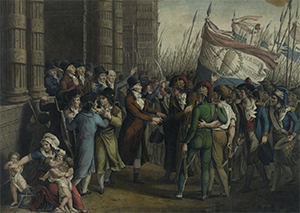The Rise and Fall of Maximilien Robespierre
Part 1: Champion of Equality, Powerful Ruler Maximilien Robespierre was one of the most well-known figures of the French Revolution. He presided over the Reign of Terror and the executions of thousands of perceived enemies of the French Republic, before meeting their same fate. 
He was born on May 6, 1758, in Artois. He lost both parents when he was young–his mother to death and his father to abandonment–and young Maximilien and his brothers and sisters lived with their grandparents. He was a good student, graduating from the famous Lycée Louis-le-Grand, and, like his father, attended law school at the University of Paris, and then set up a law practice, in Arras. His early career was full of advocacy for commoners and the poor; in fact, he worked many cases pro bono, for free. At this time, he earned the moniker "the incorruptible" for his devotion to morality. He won election to the Estates-General, summoned by King Louis XVI in 1788, as a representative of the Third Estate. 
Robespierre was one of those who broke away from the Estates-General to form the National Assembly, and he gave his whole-hearted support to the Declaration of the Rights of Man and of the Citizen. He gave the first of more than 500 public speeches on May 18, 1789. He joined the Jacobin Club (in fact joining it when it was still the Breton Club), espoused the teachings of Jean-Jacques Rousseau, and loudly voiced his support for the overthrow of the monarchy. In 1790, he became leader of the Jacobins. In 1791, he was appointed public prosecutor of Paris. Seizing another opportunity, Robespierre assumed leadership of the Montagnards, one of the two most powerful groups in the National Constituent Assembly. He founded the newspaper Le Défenseur de la Constitution ("Defense of the Constitution") and used it to advocate his political views. Robespierre was one of the main sponsors of the Self-denying Ordinance whereby members of the National Constituent Assembly were forbidden from serving in its successor, the Legislative Assembly. He was, however, elected to the next legislative iteration, the National Convention, in 1792, having in the interim been part of the Paris Commune. Like many other French radicals, Robespierre believed in a more egalitarian point of view, in life and in government. He publicly opposed slavery and the death penalty (having won a contest at the Arras Academy by writing an essay titled Mémoire sur les peines infamantes "Report on Degrading Punishments") and believed so fervently in the revolutionary cause that he supported its spread through warfare with countries still ruled by monarchs. This won him support with the sans-culottes, the large numbers of working class people who provided the muscle behind some of the revolution's most famous acts. He came to believe that the revolution was the supreme cause and that he, and others like him, should defend that cause obsessively, even violently if necessary. That zeal turned to targeting political opponents as much as military opponents. He was one of several who publicly argued for the execution of the king. Robespierre, who by this time had many supporters, convinced many in the Jacobin Club and in the National Convention to ostracize the Robespierre in July 1793 won election to the Committee of Public Safety, one of the Convention's main engines of doing business. By the time that Robespierre joined, the Committee had already created for itself a large amount of power. In Robespierre's time on the Committee, it assumed absolute power. Next page > And in the End > Page 1, 2 |
|
Social Studies for Kids
copyright 2002–2026
David White





